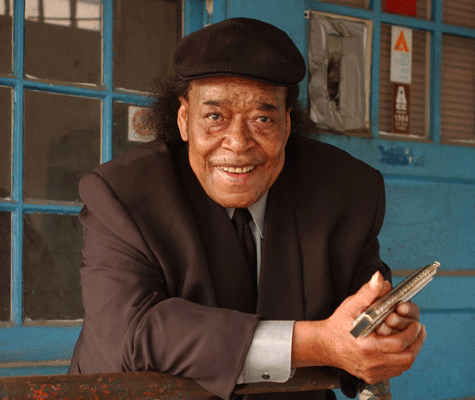JAMES
COTTON - Harmonica
 James Cotton (born: July 1, 1935, Tunica, MS; died: March 16, 2017, St. David's Medical Center; buried: Texas State Cemetery, Austin, TX), is an American blues harmonica player, singer, and songwriter who is the bandleader for the James Cotton Blues Band. He also writes songs alone, and his solo career continues to this day. His work includes the following genres: blues, delta blues, harmonica blues, and electric harmonica blues. James Cotton (born: July 1, 1935, Tunica, MS; died: March 16, 2017, St. David's Medical Center; buried: Texas State Cemetery, Austin, TX), is an American blues harmonica player, singer, and songwriter who is the bandleader for the James Cotton Blues Band. He also writes songs alone, and his solo career continues to this day. His work includes the following genres: blues, delta blues, harmonica blues, and electric harmonica blues.
Cotton became interested in music when he first heard Sonny Boy Williamson II on the radio. He left home to find Williamson in West Helena, Arkansas. Williamson mentored Cotton during his early years. When Williamson left the south to live with his estranged wife in Milwaukee, Wisconsin, he left his band in Cotton's hands. Cotton was quoted as saying, "He just gave it to me. But I couldn't hold it together 'cause I was too young and crazy in those days an' everybody in the band was grown men, so much older than me."
Whilst he played a few instruments, Cotton is famous for his work on the harmonica.
Cotton began his professional career playing the blues harp in Howling Wolf's band in the early 1950s. He made his first recordings as a solo artist for the Sun Records label in Memphis, Tennessee in 1953. Cotton began to work with the Muddy Waters Band around 1955. He performed songs such as "Got My Mojo Working" and "She's Nineteen Years Old", although he did not appear on the original recordings; long-time Muddy Waters harmonica player Little Walter was utilized on most of Muddy's recording sessions in the 1950s. Cotton's first recording session with Waters took place in June 1957, and he would alternate with Little Walter on Muddy's recording sessions until the end of the decade, and thereafter until he left to form his own band. In 1965 he formed the Jimmy Cotton Blues Quartet, utilizing Otis Spann on piano to record between gigs with Waters' band. Their performances were captured by producer Samuel Charters on volume two of the Vanguard recording Chicago/The Blues/Today!. After leaving Muddy's band in 1966, Cotton toured with Janis Joplin while pursuing a solo career. He formed the James Cotton Blues Band in 1967. They mainly performed their own arrangements of popular blues and R&B material from the 1950s and 1960s. Two albums were recorded live in Montreal that year.
In the 1960s, Cotton formed a blues band in the tradition of Bobby "Blue" Bland. Four tracks that featured the big band horn sound and traditional songs were captured on the album Two Sides of the Blue.
In the 1970s, Cotton recorded several albums with Buddah Records. Cotton played harmonica on Muddy Water's Grammy Award winning 1977 album Hard Again, produced by Johnny Winter. The James Cotton Blues Band received a Grammy nomination in 1984 for Live From Chicago: Mr. Superharp Himself!, and a second for his 1987 release, Take Me Back. He finally was awarded a Grammy for Deep in the Blues in 1996 for Best Traditional Blues Album.
A throat problem left Cotton unable to sing from the mid 1990s onwards, but he continued to tour, utilizing singers or his backing band members as vocalists. Cotton's latest album, Baby Don't You Tear My Clothes, was released in 2004.
On March 10, 2008, Cotton and Ben Harper inducted Little Walter into the Rock and Roll Hall of Fame. They performed "Juke" and "My Babe" together at the induction ceremony.
In 2006, Cotton was inducted into the Blues Hall of Fame..
A resident of Austin, Texas since 2001, James Cotton passed away on March 16, 2017 at St. David's Medical Center. He was interred at the prestigious Texas State Cemetery in Austin. He is survived by his wife, Jacklyn, two daughters and a son.
source
AWARDS
Grammy
Award, 1996 - "Deep in the Blues" - Traditional Blues
Album
Inducted into the Blues Hall of Fame, Memphis, TN, 2006
Inducted into Smithsonian Institution, 1991
Handy Award, 2003 - "35th Anniversary Jam" - Traditional
Blues Album
Handy Award, 2001, 1997 - Traditional Male Artist of the Year
Handy Award, 1997 - Acoustic Album of the Year - "Deep
In The Blues"
Handy Award, 1991, 1987 - Instrumentalist of the Year - Harmonica
Handy Award, 1991 - Contemporary Album of the Year - "Harp
Attack"
Premier Harmonica Player Award, 2000, 1999 - Memphis Chapter
of National Academy of Record Arts and Sciences
Down Beat 45th Annual Critics Poll, 1997 - "Deep in the
Blues" - Blues Album of the Year
Down Beat 62nd Annual Readers Poll, 1997 - "Deep in the
Blues" - Blues Album of the Year
Lifetime Achivement Award, 2000 - presented by The Pocono Blues
Festival
Blues Legend Award, 2002 - presented by The New England Blues
Society
Howlin' Wolf Award, 2002 - presented by The Blues Foundation
Theresa Needham Blues Award, 1994 - for oustanding service to
the Blues community
Honorary and Lifetime Member, 1993 - of the Sonny Boy Blues
Society
Check out James Cotton's own site for more information and show dates, etc.

|